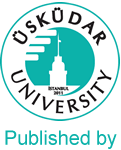Article
Makale
Lise Öğrencilerinin Okul Dışı Zaman Kullanımları: Değişken ve Birey Merkezli Bir Yaklaşım
Out-of-School Time Uses of High School Students: A Variable -and Person-Centered Approach
Asil Ali ÖZDOĞRU
Year 4, Issue 7, Pages:12-30
In addition to school and family, out-of-school time context can provide important opportunities in the development of children and adolescents. In order to examine the students' use of out-of-school time better, activity diversity, intensity, and profiles should be studied. The aim of this study is to identify different time use profiles among high school students through person-centered cluster analysis as well as variable-centered descriptive statistics. A total of 180 students, 93 female and 87 male, from the tenth and eleventh grades of a public high school in İstanbul participated in the study. A personal information form and a time use questionnaire prepared by the researcher were administered to the students. According to average time use, the first three activities with the highest values in weekly total time were (1) using internet or social media, (2) studying, and (3) watching television. The time that students devote to the activities was related to the day of the week, gender, grade level, academic achievement, and family income. Three different profiles emerged as a result of time use of the students and these profiles differed in terms of gender, grade level, and academic achievement. The results indicate the need for a closer and in-depth examination and evaluation of the out-of-school time context, which plays an important role in the development of students.
Çocuk ve ergenlerin gelişiminde okul ve aileye ek olarak okul dışı zaman bağlamı önemli fırsatlar sunabilmektedir. Öğrencilerin okul dışı zaman kullanımının daha iyi incelenebilmesi için aktivite çeşitliliği, yoğunluğu ve profillerinin araştırılması gerekmektedir. Bu çalışmanın amacı, lise öğrencileri arasındaki farklı zaman kullanım profillerini değişken merkezli tanımlayıcı istatistiklerin yanı sıra birey merkezli kümeleme analizi yoluyla ortaya çıkarmaktır. Çalışmaya İstanbul’daki bir devlet lisesinin ikinci ve üçüncü sınıflarında öğrenim gören 93 kız ve 87 erkek, toplam 180 öğrenci katılmıştır. Öğrencilere, araştırmacı tarafından hazırlanan kişisel bilgi formu ile zaman kullanım anketi uygulanmıştır. Ortalama zaman kullanım değerlerine göre haftalık toplam zaman içerisinde en yüksek ortalamaya sahip ilk üç aktivite sırasıyla (1) internet veya sosyal medya kullanmak, (2) ders çalışmak ve (3) televizyon izlemek şeklinde gözlenmiştir. Öğrencilerin aktivitelere ayırdıkları zaman, haftanın günü, cinsiyet, sınıf, akademik başarı ve aile gelir durumu ile ilişkilidir. Öğrencilerin zaman kullanımlarına göre üç farklı profil ortaya çıkmıştır ve bu profiller cinsiyet, sınıf ve akademik başarı açısından farklılaşmaktadır. Sonuçlar öğrencilerin gelişiminde önemli bir yer tutan okul dışı zaman bağlamının daha yakından ve derinlikli incelenmesinin ve değerlendirilmesinin gerekliliğine işaret etmektedir.

